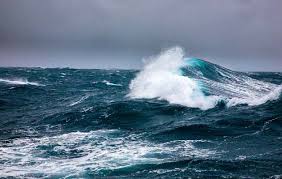Избранное из переводов Дикинсон. 107
В гавань привело!
Галантнейшее — из морей —
Согласья не дало!
И слизана oт берега
Жаднейшею волной —
Большому судну невдомёк —
Что ботик сгинул мой!
107
'Twas such a little – little boat
That toddled down the bay!
'Twas such a gallant – gallant sea
That beckoned it away!
'Twas such a greedy, greedy wave
That licked it from the Coast –
Nor ever guessed the stately sails
My little craft was lost!
Emily Dickinson
Прим. переводчика:
1. Составитель сборника стихов Дикинсон T. Джонсон (Thomas H. Johnson) данное стихотворение отнёс в раздел: "Soul, Lost boat".
2. БОТИК — (от нем. Boot лодка). Небольшое, легкое гребное судно. Словарь иностранных слов, вошедших в состав русского языка. Чудинов А.Н., 1910. БОТИК 1) небольшой бот, судно.
"On the face of it, the poem describes a tragedy on the sea: a small boat, out for a sedate sail about a bay, was tempted by the idea of a wonderful adventure on the "gallant" sea. Alas, it was then capsized by a "greedy" rogue wave and lost. A large passing ship ("the stately sails") fails to even notice its loss. The central metaphor is of a lost soul, although not necessarily "lost" in the heaven/hell sense.
It might be a tale of love: the poet, vulnerable and childlike, “toddled” out in the safe bay of her circle of friends and family but came in contact with some gallant and fascinating man. She was in deep water then, but still sailing along the relative safety of the coast until a rogue wave licked" the boat away, dooming it. The naive narrator was lost and all the sophisticated and “stately” friends never noticed a thing. Was the greedy wave another woman? Or was it something about the man himself – perhaps a greedy wave of passion?
I prefer a different reading, however: instead of a tale of a life capsized by a love affair, it may be a spiritual or intellectual crisis. Dickinson often used the sea or a bay to represent life and a boat as a soul on its journey. In this case something would have lured the little soul away from its quiet and safe journey. The sea, though, also represents a seductive and dangerous passion. Dickinson used the sea in this sense in later poems. And her contemporary, Walt Whitman (whom Dickinson claimed she'd never read) certainly used the sea in this sense. I like to think of Dickinson as tempted away from her safe life by her passion for poetry – which is another way of saying her passion for life and truth. The stately regular folk wouldn’t know how completely this passion for writing would take her, like a greedy wave, far from all the notions and beliefs that comprised the safety of her Puritan environment."
Стихи.ру 24 октября 2016 года
Свидетельство о публикации №119082107983

